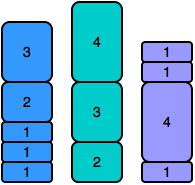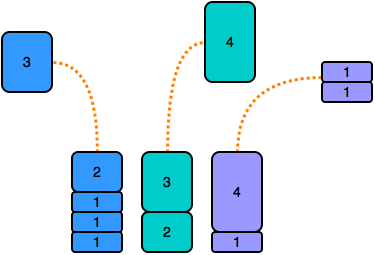Algorithm
Problem Name: Data Structures -
In this HackerRank in Data Structures -
You have three stacks of cylinders where each cylinder has the same diameter, but they may vary in height. You can change the height of a stack by removing and discarding its topmost cylinder any number of times.
Find the maximum possible height of the stacks such that all of the stacks are exactly the same height. This means you must remove zero or more cylinders from the top of zero or more of the three stacks until they are all the same height, then return the height.
Example
h1 = [1,2,1,1]
h2 = [1,1,2]
h3 = [1,1]
There are 4,3 and 2 cylinders in the three stacks, with their heights in the three arrays. Remove the top 2 cylinders from h1 (heights = [1, 2]) and from h2 (heights = [1, 1]) so that the three stacks all are 2 units tall. Return
as the answer.
Note: An empty stack is still a stack.
Function Description
Complete the equalStacks function in the editor below.
equalStacks has the following parameters:
- int h1[n1]: the first array of heights
- int h2[n2]: the second array of heights
- int h3[n3]: the third array of heights
Returns
- int: the height of the stacks when they are equalized
Input Format
The first line contains three space-separated integers, n1 ,n2 and n3 the numbers of cylinders in stacks 1,2 and 3. The subsequent lines describe the respective heights of each cylinder in a stack from top to bottom:
- The second line contains n1 space-separated integers, the cylinder heights in stack 1. The first element is the top cylinder of the stack.
- The third line contains n2 space-separated integers, the cylinder heights in stack 2.The first element is the top cylinder of the stack.
- The fourth line contains n3 space-separated integers, the cylinder heights in stack 3. The first element is the top cylinder of the stack.
Constraints
- 0 <= n1,n2,n3 <= 10**5
- 0 <= height of any cylinder <= 100
Sample Input
STDIN Function
----- --------
5 3 4 h1[] size n1 = 5, h2[] size n2 = 3, h3[] size n3 = 4
3 2 1 1 1 h1 = [3, 2, 1, 1, 1]
4 3 2 h2 = [4, 3, 2]
1 1 4 1 h3 = [1, 1, 4, 1]
Sample Output
5
Explanation
Initially, the stacks look like this:

To equalize thier heights, remove the first cylinder from stacks 1 and 2 then remove the top two cylinders from stack 3 (shown below).

The stack heights are reduced as follows:
- 8 - 3 = 5
- 9 - 4 = 5
- 7 -1 -1 = 5
All three stacks now have height = 5, the value to return.
Code Examples
#1 Code Example with C Programming
Code -
C Programming
#include <stdio.h>
#include <string.h>
#include <math.h>
#include <stdlib.h>
int findmax(int h1, int h2, int h3){
int max;
if(h1 == h2 && h2 == h3)
return h1;
max = (h1 > h2) ? 1:2;
if(max == 1)
max =(h1 > h3) ? 1:3;
else
max = (h2 > h3) ? 2:3;
return max;
}
int balance(int *N1, int * N2, int *N3, int h1, int h2, int h3, int n1, int n2, int n3){
int k1, k2, k3;
k1 =k2=k3=0;
int max = findmax(h1,h2, h3);
while(!(h1 == h2 && h2 == h3)){
max=findmax(h1, h2, h3);
if(max == 1)
h1 -= N1[k1++];
else
if(max == 2)
h2 -= N2[k2++];
else
if(max == 3)
h3 -= N3[k3++];
// printf("1:%d, 2:%d, 3:%d\n",h1, h2, h3);
if(h1 == 0 || h2 == 0 || h3 == 0)
return 0;
}
return h2;
}
int main() {
int n1,n2, n3, h1, h2, h3,i;
h1 = h2 = h3 = 0;
scanf("%d %d %d",&n1, &n2, &n3);
int *N1 = malloc(sizeof(int *)*n1);
int *N2 = malloc(sizeof(int *)*n2);
int *N3 = malloc(sizeof(int *)*n3);
for(i = 0; i < n1; i++){
scanf("%d", &N1[i]);
h1 += N1[i];
}
for(i = 0; i < n2; i++){
scanf("%d", &N2[i]);
h2 += N2[i];
}
for(i = 0; i < n3; i++){
scanf("%d", &N3[i]);
h3 += N3[i];
}
printf("%d\n", balance(N1, N2, N3, h1, h2, h3, n1, n2,n3)>;
return 0;
}
#2 Code Example with C++ Programming
Code -
C++ Programming
#include "bits/stdc++.h"
using namespace std;
#define rep(i,n) for(int (i)=0;(i) < (int)(n);++(i))
#define rer(i,l,u) for(int (i)=(int)(l);(i) < =(int)(u);++(i))
#define reu(i,l,u) for(int (i)=(int)(l);(i) < (int)(u);++(i))
static const int INF = 0x3f3f3f3f; static const long long INFL = 0x3f3f3f3f3f3f3f3fLL;
typedef vector<int> vi; typedef pair < int, int> pii; typedef vector<pair<int, int> > vpii; typedef long long ll;
template < typename T, typename U> static void amin(T &x, U y) { if(y < x> x = y; }
template < typename T, typename U> static void amax(T &x, U y) { if(x < y) x = y; }
int main() {
int n1; int n2; int n3;
while(~scanf("%d%d%d", &n1, &n2, &n3)) {
vector<int> a(n1);
for(int i = 0; i < n1; ++ i)
scanf("%d", &a[i]);
vector<int> b(n2);
for(int i = 0; i < n2; ++ i)
scanf("%d", &b[i]);
vector<int> c(n3);
for(int i = 0; i < n3; ++ i)
scanf("%d", &c[i]);
reverse(a.begin(), a.end());
reverse(b.begin(), b.end());
reverse(c.begin(), c.end()>;
map < int, int> t;
rep(k, 3) {
const vi &v = k == 0 ? a : k == 1 ? b : c;
int sum = 0;
for(int x : v) {
sum += x;
++ t[sum];
}
}
int ans = 0;
for(auto p : t) if(p.second == 3)
amax(ans, p.first);
printf("%d\n", ans);
}
return 0;
}
#3 Code Example with Java Programming
Code -
Java Programming
import java.io.*;
import java.util.*;
public class Solution {
public static void main(String[] args) {
/* Enter your code here. Read input from STDIN. Print output to STDOUT. Your class should be named Solution. */
Scanner in = new Scanner(System.in);
HashMap < Integer, ArrayList());
for(int j=0 ; j < sn[i]; j++)
{
int k = in.nextInt();
sum[i] += k;
map.get(i).add(0,k);
}
}
while (!((sum[0] == sum[1]) && (sum[1] == sum[2])))
{
int minSum = Math.max(Math.max(sum[0], sum[1]), sum[2]);
int j = 0;
if (minSum == sum[0])
j =0;
else if (minSum == sum[1])
j = 1;
else
j = 2;
sum[j] -= map.get(j).get(map.get(j).size() - 1);
map.get(j).remove(map.get(j).size() - 1);
}
System.out.println(sum[0]);
}
}
#4 Code Example with Javascript Programming
Code -
Javascript Programming
process.stdin.resume();
process.stdin.setEncoding('ascii');
var input_stdin = "";
var input_stdin_array = "";
var input_currentline = 0;
process.stdin.on('data', function (data) {
input_stdin += data;
});
process.stdin.on('end', function () {
input_stdin_array = input_stdin.split("\n");
main();
});
function readLine() {
return input_stdin_array[input_currentline++];
}
/////////////// ignore above this line ////////////////////
function main() {
var n1_temp = readLine().split(' ');
var n1 = parseInt(n1_temp[0]);
var n2 = parseInt(n1_temp[1]);
var n3 = parseInt(n1_temp[2]);
h1 = readLine().split(' ');
h1 = h1.map(Number);
h2 = readLine().split(' ');
h2 = h2.map(Number);
h3 = readLine().split(' ');
h3 = h3.map(Number);
///////////
var arrStack = [h1, h2, h3];
var arrTopPointer = [0, 0, 0];
var arrSum = [getHeight(h1), getHeight(h2), getHeight(h3)];
var index = getMaxStackIndex(arrSum);
while (index >= 0) {
arrSum[index] -= arrStack[index][arrTopPointer[index]];
arrTopPointer[index]++;
index = getMaxStackIndex(arrSum);
}
console.log(arrSum[0]);
}
function getMaxStackIndex(arrSum) {
var hasMax = false;
var maxVal = arrSum[0];
var maxIndex = 0;
for (var i = 1; i < arrSum.length; i++) {
if (arrSum[i] > maxVal) {
hasMax = true;
maxVal = arrSum[i];
maxIndex = i;
} else if ((arrSum[i] < maxVal)) {
hasMax = true;
}
}
if (hasMax) {
return maxIndex;
} else {
return -1;
}
}
function getHeight(stack) {
var sum = 0;
for (var i = 0; i < stack.length; i++) {
sum += stack[i];
}
return sum;
}
#5 Code Example with Python Programming
Code -
Python Programming
def check_equal_heights(heights):
h_0 = heights[0]
for h_i in heights[1:]:
if h_i != h_0:
return False
return True
num_blocks = [int(num) for num in input().strip().split()]
num_stacks = len(num_blocks)
stacks = []
for __ in range(num_stacks):
stack = [int(h) for h in input().strip().split()]
stacks.append(stack[::-1])
goal = 1
best_height = 0
heights = [0] * num_stacks
positions = [0] * num_stacks
total_blocks = sum(num_blocks)
while sum(positions) < total_blocks:
for i, stack in enumerate(stacks):
if positions[i] == num_blocks[i]:
continue
if heights[i] == goal:
heights[i] += stack[positions[i]]
positions[i] += 1
at_end = False
while heights[i] < goal:
if positions[i] == num_blocks[i]:
at_end = True
break
heights[i] += stack[positions[i]]
positions[i] += 1
goal = heights[i]
if at_end:
continue
if check_equal_heights(heights):
best_height = heights[i]
print(best_height)
